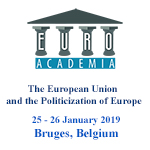Euroacademia Conferences
 Europe Inside-Out: Europe and Europeanness Exposed to Plural Observers (9th Edition) April 24 - 25, 2020
Europe Inside-Out: Europe and Europeanness Exposed to Plural Observers (9th Edition) April 24 - 25, 2020 Identities and Identifications: Politicized Uses of Collective Identities (9th Edition) June 12 - 13, 2020
Identities and Identifications: Politicized Uses of Collective Identities (9th Edition) June 12 - 13, 2020 8th Forum of Critical Studies: Asking Big Questions Again January 24 - 25, 2020
8th Forum of Critical Studies: Asking Big Questions Again January 24 - 25, 2020 Re-Inventing Eastern Europe (7th Edition) December 13 - 14, 2019
Re-Inventing Eastern Europe (7th Edition) December 13 - 14, 2019 The European Union and the Politicization of Europe (8th Edition) October 25 - 26, 2019
The European Union and the Politicization of Europe (8th Edition) October 25 - 26, 2019 Identities and Identifications: Politicized Uses of Collective Identities (8th Edition) June 28 - 29, 2019
Identities and Identifications: Politicized Uses of Collective Identities (8th Edition) June 28 - 29, 2019 The European Union and the Politicization of Europe (7th Edition) January 25 - 26, 2019
The European Union and the Politicization of Europe (7th Edition) January 25 - 26, 2019 7th Forum of Critical Studies: Asking Big Questions Again November 23 - 24, 2018
7th Forum of Critical Studies: Asking Big Questions Again November 23 - 24, 2018 Europe Inside-Out: Europe and Europeanness Exposed to Plural Observers (8th Edition) September 28 - 30, 2018
Europe Inside-Out: Europe and Europeanness Exposed to Plural Observers (8th Edition) September 28 - 30, 2018 Identities and Identifications: Politicized Uses of Collective Identities (7th Edition) June 14 - 15, 2018
Identities and Identifications: Politicized Uses of Collective Identities (7th Edition) June 14 - 15, 2018
Brexit, History and Education: Recognising Conflict in a Period of Upheaval
-
-

-
Presentation speakers
- Erin Bell, University of Lincoln, UK
- Florian Gleisner, University of Lincoln, UK
- Download presentation
Abstract:
This paper will outline the implications of the UK referendum of 23 June 2016 on a recently completed EU-funded project into History teaching in secondary schools. Various scholars have noted the problems that may arise for UK researchers, particularly but not solely after March 2019, in terms of access to funding and the loss of a shared research community (e.g. Stock 2018; Trees 2016); they have also have acknowledged the role of heritage and archaeology in bolstering the ‘new nationalisms’ arising in Europe as a whole in recent years, and in the UK in particular (e.g. Gardner 2017). However, little has been offered by scholars undertaking research with European partners during the period 2015-19. By contrasting the intended outcomes of the E-Story project with the actual results, the impact of the referendum, which took place within the first year of the 30-month project, was significant despite being primarily a UK event. Although many of the limitations faced by the UK team may be ascribed to the different pedagogical environment experienced by school teachers in the UK in contrast to, for example Italy, the months of campaigning forming a prelude to the referendum, and the aftermath of uncertainty and political division, undoubtedly shaped the responses of the educators, students and researchers involved. In addition, the focus of the project was the use of IT in teaching the history of the First World War, rather than European industrialisation or the history of the EU. This therefore positioned those engaging with UK teachers, who expected an overview of the aims of the project, as sharing the benefits of the EU whilst rehearsing a well-known history of conflict. This paper seeks, then, to interrogate the role of an international project about the representation of the past, during a period of historic social upheaval and uncertainty, by drawing on George Santayana’s assertion (1905) that ‘Progress, far from consisting in change, depends on retentiveness…Those who cannot remember the past are condemned to repeat it’, and its misrepresentation in wider culture, in order to contextualise the contradictions posed by the project in a time of change and amnesia in the UK.
-
Related Presentations

EU’s Civil Society Bias in the Neighbourhood: A Case Study on Culture
- Riccardo Trobbiani
- Domenico Valenza













